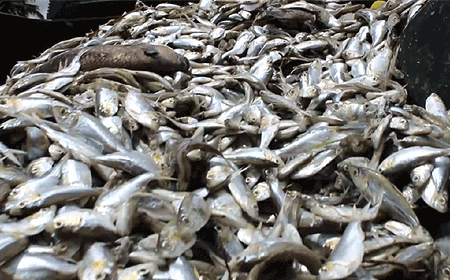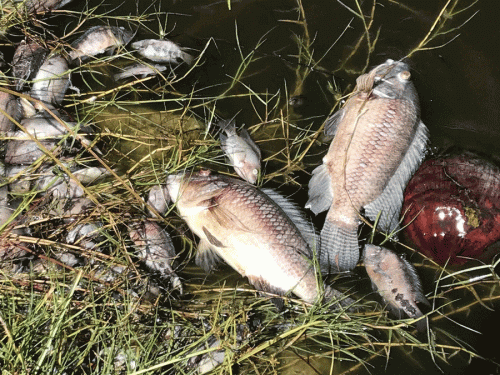Orange Walk residents are not satisfied with DOE efforts to address New River pollution; even crocodiles are dying
BELIZE CITY, Mon. Aug. 26, 2019– The fish kill in the New River which runs through the Orange Walk District has worsened to the point where even crocodiles and turtles which inhabit this river are now turning up dead. On Friday night, officers from the Department of the Environment (DOE) descended on Orange Walk to make presentations about the increasing threats to the New River.
An estimated 500 Orange Walk residents took the time out to attend the DOE presentation, which was expressed mostly in specialized technical jargon that was aided with the use of a Microsoft PowerPoint presentation.
In the question-and-answer session, however, it was revealed that the DOE has no immediate plan in place to address the conditions which are said to be responsible for polluting the river.
The DOE officers making the presentations all appeared to be experts in the various fields having to do with understanding the root causes of the dire condition of the New River, but although there are regulations in place and compliance personnel to monitor the river, no one entity is held responsible.
The New River lies on what is described as flatlands upon which there are a lot of farming activities having to do with the growing of sugar cane to feed the two sugar factories in the Orange Walk District. Apart from the intensive farming activities, which are one contributory factor to what ails the New River, there are other industries on the banks of the river that emit pollutants which are dumped into the waters of the river.
One questioner literally scolded the DOE for its reliance on the data that ASR/BSI provided to it, when the sugar factory is considered the primary culprit that is responsible for the tragic condition affecting the river.
Another questioner pointed out that it was a good technical presentation, but that it appeared that something is being hidden from us, because this is the first time that the pollution has reached Guinea Grass Village.
“Three tons of fish have been moved from the river; how are you guys (DOE) going to help us? Do something tomorrow when your office opens,” a questioner told the DOE presenters.
In addition, the DOE has been accused of taking time out to defend ASR/BSI. “ASR/BSI are not one hundred percent innocent”, the questioner pointed out.
The DOE was asked how many river surveys have they conducted between 2016 and the present time and whether they have data from those surveys to compare with the ones presented by ASR/BSI.
The DOE compliance officer told those in attendance at the meeting that there is no pressure under the law to charge anyone for the pollution of the river.
In the end it was proposed that the watershed be managed properly. One of the DOE presenters also encouraged those attending to plant more trees.
One resident of Chan Pine Ridge told the DOE that the people of his village rejected the DOE and its pollution plan.
“We cannot trust the DOE with its great grandstand on the Environmental Compliance Plan” one attendee said.
“This is the worst form of corporate savagery”, one person in attendance at the presentation told the DOE.
In order to adequately understand the significance of the death of crocodiles in the New River, we reproduce part of an article by the New Scientist, written in 2015. When river pollution is so bad that it kills crocodiles, it is time to worry.
Germ-killing molecules identified in alligator blood
by Curtis Abraham
March 2, 2015 (NewScientist)
Thick armour and jaws packed full of teeth aren’t the only defences that alligators and crocodiles have. They also have formidable immune systems and some of the protective molecules that enable this have now been identified. Their discovery in the blood of the American alligator might even pave the way for a new generation of antibiotics.
Crocodilians have existed on Earth for at least 37 million years. Over the course of their evolution, they have developed a very strong defence against infection. “They inflict wounds on each other from which they frequently recover without complications from infection despite the fact that the environments in which they live are less than sterile,” says Barney Bishop of George Mason University in Fairfax, Virginia, co-author of the new study.
American alligators have an enviable innate immune system, the “primitive” first line of defence that is shared by all vertebrates. In 2008, chemists in Louisiana found that blood serum taken from the reptiles destroyed 23 strains of bacteria and depleted reserves of the HIV virus.



